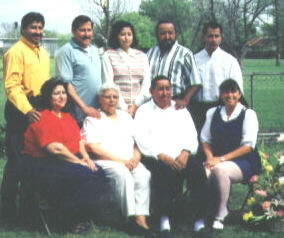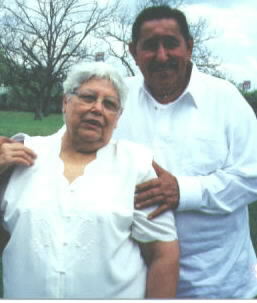Francisco Reyna Cantu Espinoza
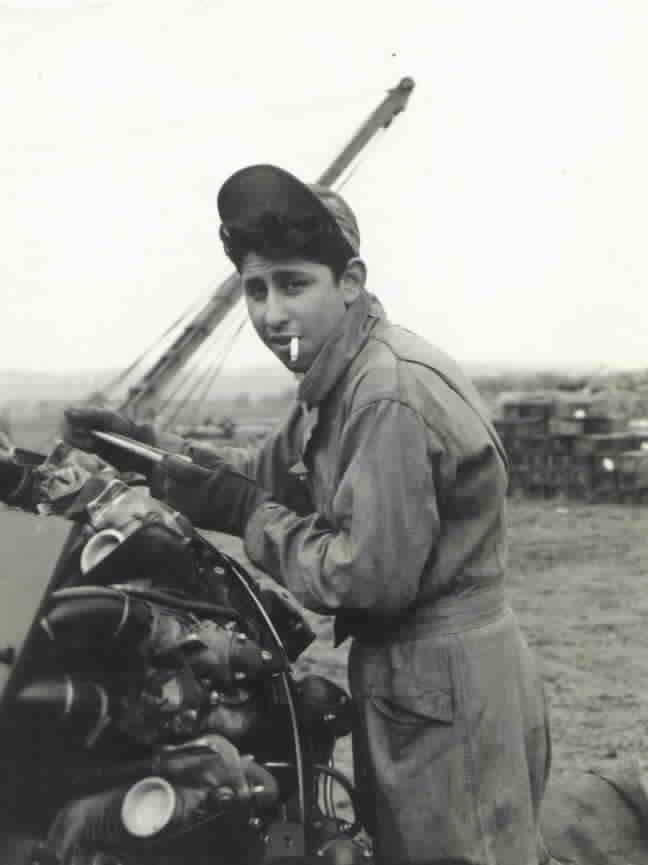

What was your home life before you join the service?
Well before that I just worked groceries store and would take meals for the poor. I worked in a warehouse where they keep all
these condiments I used to come home with flour, sugar, beans, grain and other stuff that I would bring from
this warehouse home.
Was that your pay?
Yes, that is how I would get paid then.
Did you go to school and work at the same time?
Yes, I worked and went to school. When I was in school the governments were offering work to different people
and help you with WPA program .
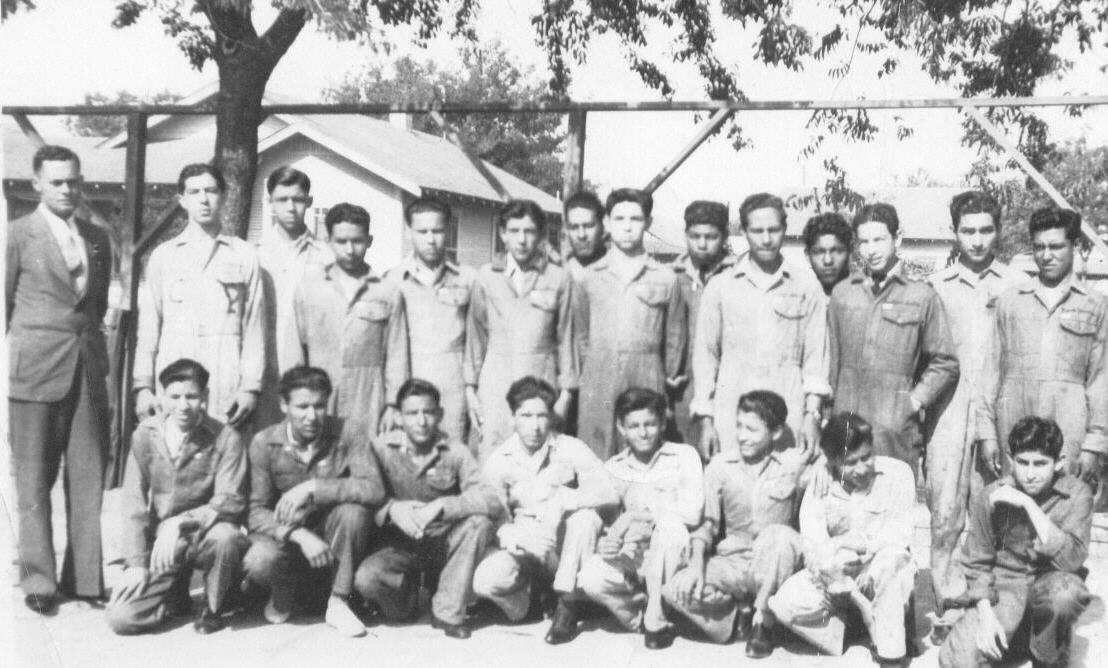
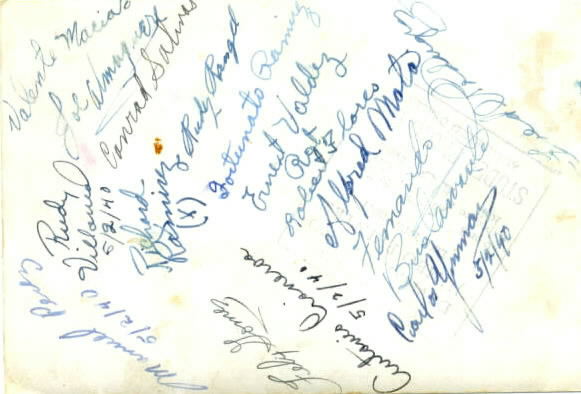
What was the WPA program and what did it stand for?
It stands for Work Progress Administration. It was a program that the government had instituted
to try to make work for the young people.
Did you get picked for this program or did you qualify?
Since I was in the ROTC Reserve Officers Training Corp. I believe that was one of the reasons I was chosen for it.
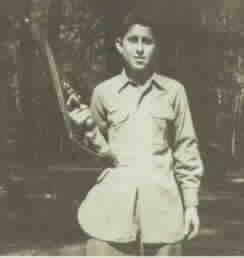
Did you get any special training from the government for that program?
No partially no they just help you with a job.
So what kind of job did you get from that program?
Well we tended animals at the time because the Freeman Coliseum was the stable for the first Cavalier Division.
And they stabled all the animals in the Freeman Coliseum. That is why they called it the Freeman Coliseum that was the
name of the persons who owned the property. They made an allocation for us to able to go there I imagine to learn about
how were the animals were treated how they were fed how the condition that pertain to animal training. I suppose or
believing they intending to eventually training us into the Cavalry situation. But it just never turned out that way.
The war broke out in America at that time we were in isolation in this country. When the war broke out Roosevelt and
Churchill got together and itís when the real conditions were when the people that worked for the WPA were to enlist
During what time in the WPA were you asked to enlist?
I enlisted in 1939 but did not leave until September 1942
Did you enlisted in the Army because you were in the WPA program or you enlisted in the Army because it was your choice?
Well when I enlisted in the Army was because they wouldnít take me in the Navy.
What was the reason not being able to join the Navy?
They would not let me join the Navy because of my eye site. In those days they would not permit a person to wear
any glasses into the service. They just would take persons that would not wear glasses. They permit glasses today but
they wouldn't back then.
Where did you get sent when you enlisted? Did you go to boot camp? or Did you go straight to war?
NO, I went to Boca Raton, Florida to go to commissionerís officerís training school and being young and flighty as
I was and full of nerves I got into a fight with my first sergeant. And so they demoted me and they put me in the
Non-commission rank Instead of the officers training rank. I was put in the non-commissioners officers training rank and
that is where I graduated from. I graduated as a Corporal. So when I went to war I was already an active corporal.
All of the commissions we had then were active. They were for the duration.
So what were you trained to do?
Well I was a riffle man. I handle a VAR grounding automatic riffle. I was trained to carry a machine gun and at
that time the grounding automatic riffle was a portable machine gun with a tripod. You could lay on the ground and
throw out the tripod and aim the gun as a machine gun. The only machine gun were available to the other troops were
held with their hands, hand guns they were forty fives those were the only weapons that we had then.
How was your training a crash course of did you have a six month training before you went to War?
Yes, I had a crash course I was trained in six week and learned as much as we could then we were sent out to the
field to fight the battle.
After your boot camp and training where did you get sent?
During the time I finished what they called boot camp in six weeks. The Invasion of Casablanca had just started and I
was sent.
You said early that you were sent to war during the Invasion of Casablanca . Where did you inter from?
We came in through the mouth of the Mediterranean and landed about northern
mouth of Africa.
Do you remember the name of the town?
Orey, north Africa
When you landed in Africa where the platoons land threw or you did dock threw?
Orey, Northern Africa we just landed we proceeded in land and took the African coastal road. Until we reached Tunis,
Africa.
How long did you stayed in Tunis?
We stayed three months while we got prepared and while we finished defeating the something that the Germans
called the Desert Fox that was orders by the German General. So we had to wait until we got the orders to move on.
Who was the German General?
During the war affair in Africa in Indonesia the British had control that part of the country all the way up to
Algeria coming from the south west of the canal coming up towards the opening of the mouth they had control up to that
point of that land they had all the shipping lanes the British government they control up to Tunisia down this place where
Germany had taken over through these efforts of this General which they called the Desert Fox he wiped out the first
American troops that they send against him we were sent there so while we entered we had to go in with that same tone to
for that type of condition to drove him back until we reached Sicily
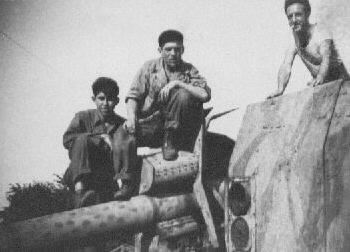
After your three months in Tunis and North Africa where else did you go?
We crossed over to Sicily and fought through the length of Italy and we out of Italy in a place called Chivatavequia
and fought through Sardinia then we waited for the Invasion of Southern France . We waited for about a month and got the call and
proceed to invaded Southern France and we cross to this little town called Sisteron, Valmontone and we walked and fought all through
Germany. We walked though Germany until we got to Norway and then shipped out from Norway.
Mr. Espinoza what year was that?
I really donít remember but it had to be towards the end of my termination of my term On June 5,1944 we were
crossing into Rome and we kept going. People have asked me if I was ever afraid while I was at war. Really I never had
a chance to even think about it.
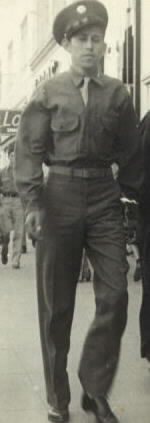
Did you ever hear anything about anyone talk about the Big Three?
NO I read it later afterwards. We really didnít hear what was going around the world we were like lost in a land
where nothing was ever said other than the letters we received.
Is there anything that you would like to share with me that I have not asked you?
Other than that this time I was the only Mexican American that was in the out field going to war. At the time there
was a lot of prejudice in the air and Mexicans were still like black people treated even in the service. I was
seem to them fairly educated I was put in the position to write the letters for all the other Mexicans or aliens. If you
chose to call them aliens. They were recruited to serve in the service at the time, because a lot of them came from across the
boarder at the time to be recruited into the service for the government. Many of the them didnít know how to read or
write and I was called upon to write their letters to their parents or read their letters or help them interpret their
feelings. I remember sitting for hour listening to the jukebox the country and Mexican music. You know that Mexican
music that we all loved and reading them their letters.

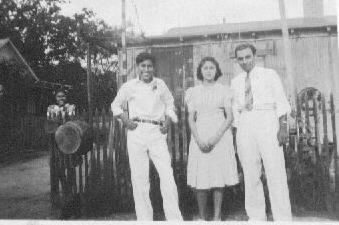
As you mentioned earlier, how did the Hispanics and African Americans were treated different in what way or how were
they treated?
As I said I believe a belief because that you are a native origin and because a black being of a slave condition
does not have the where with all from which where to make up his mind. And consequently they play on what they consider
to be this lack of intelligent.
In the army were Hispanics and black how did they treat you different in what way?
now the black person in my day in the army was not segregated but his job was totally separated form us at that
time strictly a truck driver or a cook they never mingle with us. The black never associated with the Hispanics they had
their own shower stalls, and had a different camp. Us as Mexican Americans there were places you were treated like an
Indian. In fact they didnít even now what a Mexican was.
Mr. Espinoza you that have a white complexion did you pass as a white person?
Yes the fact that the Anglo would see through the fact that you were a Mexican and saw (Mexico) that would come to live in
Texas gave you away to them and so they would segregated from them. But in the war the Anglo and the Mexican and the few
they were in my company his name was Melendez he was from New York during the war Italy and Africa I never saw any other
Mexican s until we came into the battle in Italy. We joined the 36th and the 45th infantry they were from Texas and thatís where all
the Mexican's meet.
Where the white people the bosses or did they do the same thing like the rest of the platoons?
No they were in the same as we were in the contrast they were Privates, Corporals, BFC, Sergeants, they themselves,
we ourselves like it is today we separate ourselves not necessary they forced the separation on you it was more less that
you felt more comfortable with your own kind but in the action war there was no one that fought against each other, but we
all fought side by side. The segregation is what we impose upon ourselves.
What affect did you think WWII has on your family or friends?
Well I lost my girlfriend she wrote a letter to my sister Mary telling her that she could not just sit around
and do nothing and wait for me, and not knowing what would happen to me. She just had to do something with her life
hoping that nothing would happen to me and when I came back from the WWII I would re-establish our relationship. It never
work out that way but this is what happened to my life because of the war she was a very good friend of Mary it was through
Mary that I heard from her and Mary was my sister.
Was your mother and father were still alive while you were in the WW II?
Yes, but my mother was always their but my father and mother were separated at about the fink war from each
other.
What was the Finck war?
Well that was when were having those debates about the Finck cigar company's with Emma Tenayuca and all of the
progressives were trying institute peoples right, womenís right, menís right, workers rights it was a war of
independence for the individual person it was during the time of reconstruction. And so I always refer it to
during the fink war because it was during that time. I remember it was settle around the Municipal Auditorium
down of the center of town meeting, rallyís all took place in front of the Municipalís Auditorium here in San
Antonio.
If you would want to change something about the pass what would it had been?
The fact that my father and mother had to do what they did in order to survive. Is the one wish I that I always
hold it in the back of my mind. That would had never of occurred that handling the raid to support your family should
have never been instituted. It was such a greed pain they had such great fight over it. My father would turn vicious on my
mother and my mother was a stock harden women she supported everything he gave her. He did with her and of course both
would do it together and to each other out of pure need one thing in my life that I wish it would never had occurred is
that occasion in their life.
Mr. Espinoza could you be clear in what you mean occasion in their life?
They would had never been driven into the condition of having to bootlegging. In those days in order to support
in themselves you see that a condition in their life that I wish I hoped it should had never have occurred, and of
course I imagine that was the only way my father could had support themselves. More my father had to induce her to
help him. He had no family and my mother had sisters. Of my older aunts I do not know anything of them I never met them and
think they were set to school because they were very well educated people
What year did you get married? An to who ?
I married after I came back from the service since I had lost my girl friend while I was in the war. I later meet
my wife Maria De Carmen Galindo. We married in March 27, 1949.
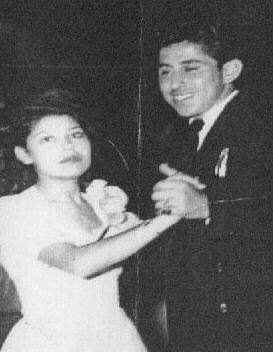
How many children do you and Maria De Carmen have together.
We have eight children four boys and four girls. My wife and I lost one child at birth
